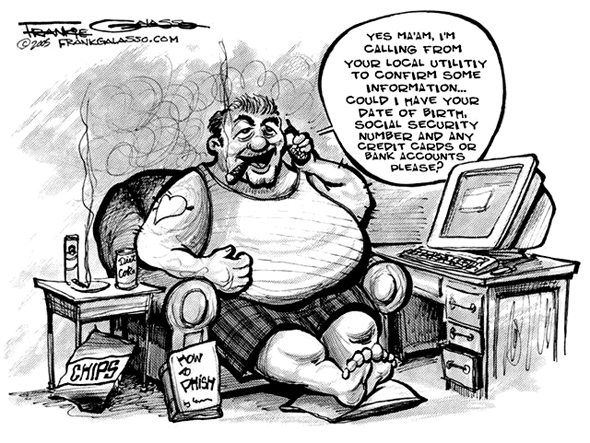Protect Your Identity: Do This Today! Do this Now!

Telling Tips is a series of articles from local experts to help you save money, make better decisions and plan for a better future.
It just takes a few minutes.
This quarter, contact Transunion.
One way to protect your identity is to check your credit reports on a regular basis to ensure that there are no loans, credit cards, or other financial obligations that have been fraudulently initiated in your name. By law, you are entitled to a free credit report every 12 months from each of the national consumer credit reporting agencies, Experian, Equifax, and TransUnion. I suggest that you check one agency in January, the next in May, and the third in September.
Take a minute: Your identity’s been stolen! Check out the ID Theft FaceOff game.
More you can do:
- Place a fraud alert on your credit report. Whenever you file a fraud alert, all three credit bureaus will automatically send you a free hardcopy of your credit report.
- Get your FREE credit score regularly and instantly! And keep track of your score monthly. CreditSesame uses Experian, CreditKarma uses TransUnion, and Equifax Score Card uses Equifax.
After You Get Your Credit Report
When you get your credit report, review it carefully. If you see something on your credit report, such as an unpaid bill that you simply forgot about, act right away to resolve it. Then ask the business to whom you owed the money to send a letter to the credit reporting agencies saying that the matter has been resolved.
Also, make sure your credit report is accurate. Check for accounts you didn’t open, charges you didn’t make, and delinquencies you didn’t cause. If you see evidence of fraud, contact the credit reporting agencies immediately. Explain the situation and ask that a fraud alert be placed in your file. Also report the fraud to the police and obtain a police report.
Your creditworthiness will follow you throughout your life and can help you, financially, or hurt you.
Review your credit report carefully!
Medical Information Used For Insurance Underwriting
MIB (previously known as Medical Information Bureau) is run by 470 insurance companies and has a “primary mission of detecting and deterring fraud that may occur in the course of obtaining life, health, disability income, critical illness, and long-term care insurance.” Your consumer report “contains information of underwriting significance (medical and avocation information) about North American consumers who have applied for life and health insurance with MIB member companies.” If you have not applied for individually underwritten life, health, or disability income insurance during the preceding seven year period, then you probably don’t have a record.
Request a free copy of your MIB consumer file.
Rejected For A Bank Account? Get Your Free Annual ChexSystems Report
ChexSystems is a consumer information database that contains information about your banking history (like overdrawing your account, or opening or closing an account), similar to credit bureaus and your credit history. You have the right to a free ChexSystems report once a year, just like the annual credit reports. In addition, you can request one whenever you get declined for a bank account where ChexSystems was used.
Get a free copy of your ChexSystems consumer report
Answer These, True or False:
Q 1: When you get married your credit report is merged with your spouse’s to create a combined credit report.
Q 2: Closing credit card accounts will always have a positive impact on my credit score.
Q 3: There are many different score models that can be used to calculate your credit score.
A 1: False: Since credit reporting agencies only maintain credit files on individuals, your credit file remains as your individual credit file when you get married. The only information that would appear on both you and your spouse’s reports would be joint accounts or those for which one spouse is an authorized user, or other items in both of your names, such civil judgments, liens and bankruptcies.
A 2: False: Closing credit card accounts may not always be a good idea for two reasons: (1) It can hurt your credit to debt ratio (2) It could also hurt of the length of your credit history if you close an older account. Also, don’t open new credit cards that you don’t need just to increase your available credit. This approach could also backfire and actually have a negative impact on your score.
A 3: True: While there are many different types of scoring models available in the market today, the FICO® score is used most often by lenders when determining whether or not to lend you money and at what rate. Further, lenders also may use a specialized scoring model to meet their specific needs. For example, an auto dealer might use an “auto adjusted” score model to add more weight to your auto loan payment history.
Have a good week. You deserve it.
Joseph Reisman, of Joseph S. Reisman & Associates, has been serving tax prep and business accounting expertise from his Coney Island Avenue office for more than 25 years. Check out the firm’s website.




